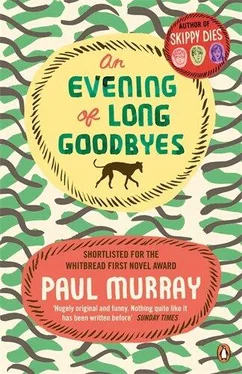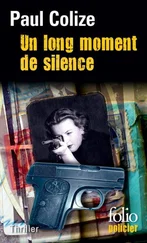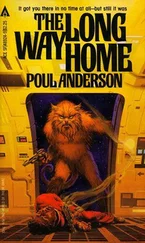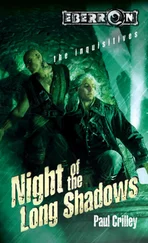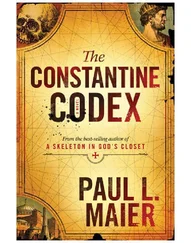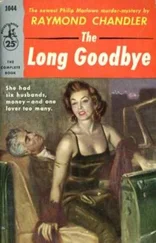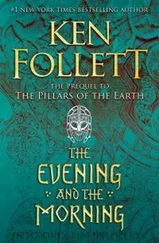Paul Murray - An Evening of Long Goodbyes
Здесь есть возможность читать онлайн «Paul Murray - An Evening of Long Goodbyes» весь текст электронной книги совершенно бесплатно (целиком полную версию без сокращений). В некоторых случаях можно слушать аудио, скачать через торрент в формате fb2 и присутствует краткое содержание. Год выпуска: 2009, Издательство: Penguin Adult, Жанр: Современная проза, на английском языке. Описание произведения, (предисловие) а так же отзывы посетителей доступны на портале библиотеки ЛибКат.
- Название:An Evening of Long Goodbyes
- Автор:
- Издательство:Penguin Adult
- Жанр:
- Год:2009
- ISBN:нет данных
- Рейтинг книги:3 / 5. Голосов: 1
-
Избранное:Добавить в избранное
- Отзывы:
-
Ваша оценка:
- 60
- 1
- 2
- 3
- 4
- 5
An Evening of Long Goodbyes: краткое содержание, описание и аннотация
Предлагаем к чтению аннотацию, описание, краткое содержание или предисловие (зависит от того, что написал сам автор книги «An Evening of Long Goodbyes»). Если вы не нашли необходимую информацию о книге — напишите в комментариях, мы постараемся отыскать её.
An Evening of Long Goodbyes — читать онлайн бесплатно полную книгу (весь текст) целиком
Ниже представлен текст книги, разбитый по страницам. Система сохранения места последней прочитанной страницы, позволяет с удобством читать онлайн бесплатно книгу «An Evening of Long Goodbyes», без необходимости каждый раз заново искать на чём Вы остановились. Поставьте закладку, и сможете в любой момент перейти на страницу, на которой закончили чтение.
Интервал:
Закладка:
It was hard to say exactly when Gene’s crack-up began. The day she arrived in Hollywood she had got stomach cramps and they didn’t go away until she left for good, fourteen years later. On her fourth picture, Belle Starr , she had come down with an eye complaint that no one was able to explain: her eyes would swell up and itch, and shooting would have to be suspended for days on end. (Cassini used to visit her in the trailer and kiss her hideously inflamed eyelids and assure her she was still beautiful to him; she would say that that was when she first knew he really loved her.) But people who knew her well saw that this was different — that the relationship with Aly Khan was a symptom of a spiralling mental state.
She began to have difficulty remembering her lines. This had never happened before. She was under no illusions as to her gifts as an actress, but she had always been able to memorize her parts; in fact she used to say that she felt best when she was playing someone else, and that it was when she was herself that her troubles began. Now she became aggressive and bossy on set. Her moods fluctuated wildly from stretches of total lethargy to flashes of hyperreal awareness when she said she could see God in a light bulb.
The last picture before her breakdown was The Left Hand of God , with Humphrey Bogart. Bogey’s sister had been mentally ill; he knew the signs. He went to the studios and told them that Gene needed help. They assured him that Gene Tierney was a trouper and wouldn’t let them down, not on a movie as expensive as this one.
It was Bogey’s kindness that carried her through the picture; he was dying of cancer then, though nobody knew it. Afterwards, she remembered the time of the shoot as being itself like a silent movie. There were no sounds or words — but she told her doctors she could see herself the whole time, as if she were floating outside her own body, watching herself from afar.
11
It wasn’t the haranguing that worried me; one didn’t live with Bel for twenty-odd years without getting used to being harangued every once in a while. As for being banished from Amaurot, I was getting used to that too.
‘But she asked me for support. Bel never asks me for support. In all the years I’ve known her she’s never once asked me for support or advice or so much as a hand assembling her Sindy’s Dream Kitchen…’ I swirled my glass and frowned into the vortex. ‘Something’s up, I can tell. And it’s something to do with that blighter Harry.’
‘He’s a balloon, right enough,’ Frank commented from the sofa.
‘It’s not just that he’s a balloon,’ I said. ‘He’s an actor . They’re bad news. Personally I wouldn’t trust an actor as far as I could throw one. Because look at the facts. The facts are that she’s known him for four years without a hint of romance, and then the moment this theatre idea manifests itself he reappears with a script in his hand and suddenly everything’s Doris Day and pylons singing in the wind, with Mother eating out of his hand and the run of the whole house.’ I paced over to the kitchen door. ‘I mean, talk about your tailor-made parts.’
‘Some day,’ Frank said, staring at the ceiling, ‘he’s going to get what’s coming to him.’
‘If only she weren’t so infernally naïve,’ I said vexedly. ‘The fundamental problem with Bel is that she’s so naïve that she’s under the impression she’s streetwise . She shouldn’t be let within a thousand miles of a blackguard like Harry — blast it, what was I thinking , leaving her there on her own? How could I just let her fall into the hands of that snake in the grass?’
‘Snakes don’t have hands, Charlie.’
‘Be quiet, Frank, there’s a good fellow.’ I crossed back over to the tallboy. Frank had found it in a skip; dilapidated as it was, I’d taken rather a shine to it, and persuaded him not to sell it. Things never seemed quite as grim with a tallboy in the house.
I refilled my glass, drumming my fingers on the wood. It had to be Harry; what other reason could there possibly be for that bizarre performance? She had her wretched theatre, she had her leading role, she had filled the house with Marxists; the only conceivable explanation was that this latest dalliance had somehow gone awry.
This, if it were the case, would not be without precedent. She had always played her romances out this way — back to front, I mean: chancing upon these chumps and falling in love with them purely because they fit whatever impracticable ideal she was labouring under at the time, diving in head-first without a moment’s thought, and when it went wrong, as it inevitably did, blaming it on me and my interfering. The fact was, though, that Bel needed somebody to interfere. She might get away with that kind of recklessness with a character like Frank, who couldn’t think two things at the same time without having to sit down. This Harry was another kettle of fish entirely. He was a schemer, a dissembler; one of these sneaky types that spend their evenings in a basement, cobbling together new personalities for themselves. But what could I do about it, stuck miles away in my slum? How could I help her from here?
A few days after the visit Mother called to tell me that Old Man Thompson was dead. Apparently Olivier had accidentally left him on the verandah while he went out for groceries; he came home to find the old man stiff in his bath chair, ‘frozen like a fish-stick,’ as Mother picturesquely put it. Olivier was hysterical. It had taken three paramedics to prise him away from the old man’s body; they wouldn’t allow him to ride in the ambulance, and Mother said he’d stayed out on the lawn for hours after they’d left, bawling and running around and practically howling at the moon.
The real reason she called was to ask me if I was available to help out at the premiere of Ramp in two weeks’ time. They were going ahead with Mirela’s idea and staging a special one-off performance in the house, to which potential investors would be invited. It seemed to me rather paradoxical to have a fundraiser in such lavish surroundings; but Mother explained it was common knowledge that the best way to get money out of the better-off was to look like you didn’t need it. There would be complimentary tickets, she said, for everyone who lent a hand.
I told her that enticing as that offer was, given the direction our last meeting had taken, it might be better if I stayed out of Bel’s way for a while. ‘She seems a little highly strung,’ I said.
Mother would not hear of this. ‘There is nothing remotely the matter with that girl,’ she said, ‘other than resentment because she is no longer the centre of attention.’
‘You don’t think she might be…?’
‘Not in the slightest,’ Mother said firmly.
I wished I could be so sure. After what had happened at the house, I wondered if Thompson’s death might not be some sort of portent. I began to feel, in the days that followed, a nameless darkness pressing down on me; and now at night it seemed I could hear Olivier’s banshee cry, borne in on the wind.
Even the news of that time seemed to take on an antic slant: the bodies waiting under the clay in the Balkans; the steady stream of grey-suited politicians declaring their corruption to the tribunals; once, during a live report from some kind of fracas at an accountants’ convention in Seattle, I could have sworn I saw one of the builders, hurtling around with what looked like a large yellow plastic W taped to his head, mooing noisily as four policemen in gas masks chased him with their batons.
The solution came to me one evening from a quite unexpected source: though really, like the best solutions, it had been right under my nose all along. Frank was in the kitchen throwing pots about; Droyd had gone off to sign in with his parole officer; I was sitting there in the armchair as I always did after work, smoking a pipe that Frank had brought home in one of his boxes and thinking what bad luck it was that of all the rotters in the world Bel had hitched her wagon to Harry. In short, it was an evening like any other, except that someone must have rearranged the rubbish, or else Frank had found a more credulous than usual buyer in the last day or two, because there was an unusual air of spaciousness in the room, and several areas of carpet I was sure I hadn’t seen before. Fresh flowers, furthermore, had materialized in a vase on the table; the television had been switched off and the apartment lit instead by an old-fashioned storm lantern, hung from the fixture in the ceiling. And now Frank came in and began skirting the room, picking things up and glancing meaninglessly at the bottoms of them. After a while he started making me nervous, so I asked him what he was doing.
Читать дальшеИнтервал:
Закладка:
Похожие книги на «An Evening of Long Goodbyes»
Представляем Вашему вниманию похожие книги на «An Evening of Long Goodbyes» списком для выбора. Мы отобрали схожую по названию и смыслу литературу в надежде предоставить читателям больше вариантов отыскать новые, интересные, ещё непрочитанные произведения.
Обсуждение, отзывы о книге «An Evening of Long Goodbyes» и просто собственные мнения читателей. Оставьте ваши комментарии, напишите, что Вы думаете о произведении, его смысле или главных героях. Укажите что конкретно понравилось, а что нет, и почему Вы так считаете.
